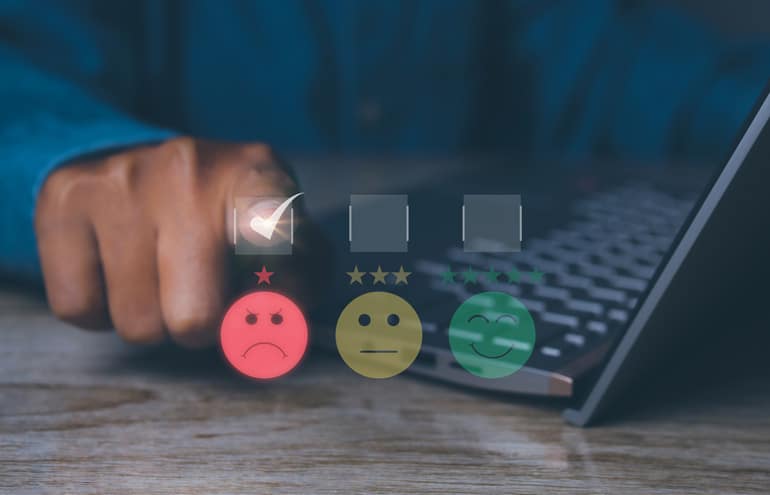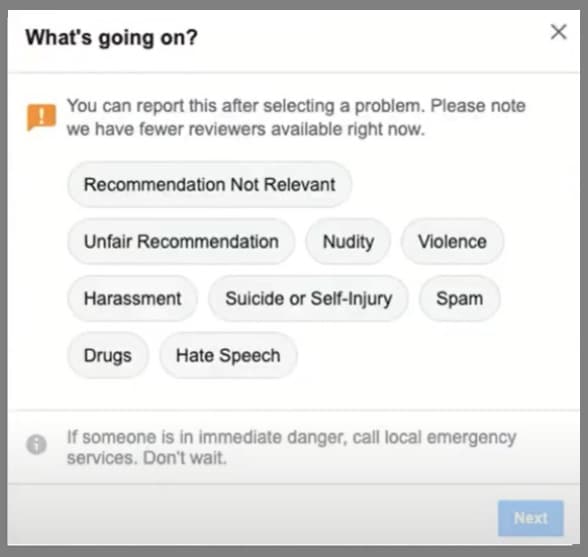QUESTION: After spending the last two years focused on boosting my online reputation through positive reviews (mostly on Google), I recently received a one-star review with little identification or context. I don’t recognize the name, so I’m guessing it’s spam. If the bad reviewer is not a current or former client and has never consulted with me, may I respond to the negative review by stating that I have never represented the individual?

ANSWER: Great work taking the reins of your online reputation management! Online reviews are today’s word-of-mouth recommendations, which makes receiving a negative review that much more troublesome.
Table of contents
- So, What to Do?
- First, Consider the Legitimacy of the Online Review
- Going to the Reviewer
- Going to the Website
- Engage or Move On?
- Considering Confidentiality Issues
- Tips for Responding to a Negative Review
- Can AI Help Draft a Response?
- Phone a Friend
- About the Illinois Supreme Court Commission on Professionalism
- Additional Articles About Online Reviews
When our personal and professional abilities are challenged, we may want to react impulsively and emotionally. This is understandable. We are naturally inclined to protect ourselves and our work, even from trivial remarks.
However, responding too quickly may compromise our reputation in front of the challenger and, more importantly, the audience of future clients, not to mention risk ethical violations.
So, What to Do?
You have three options when you receive negative online attorney reviews:
- Attempt to remove the review.
- Ignore the review.
- Respond to the review.
As not every negative review is the same, I will explore all three options in detail below so you can be best prepared.
First, Consider the Legitimacy of the Online Review
Before you do anything else, analyze the negative review to determine if it’s inappropriate or in violation of the terms of service of the website on which it was posted. Aside from violations like using profane language or mentioning something irrelevant (e.g., leaving a review for a car wash on a law firm profile), consider the legitimacy of the review.
Consider if the reviewer is a former or current client. Did they mistake you for another attorney with a similar name? Did they admit in the review that they’ve never been your client or sought counsel from you?
If the post is inappropriate or irrelevant, you should follow the website’s protocol to flag it for removal. If it’s a mistaken review, such as meant for another attorney, you might be able to identify and contact the reviewer to correct it. And if it is legitimate, are you better off responding or ignoring the post?
Next, I will explore each of these scenarios.
Going to the Reviewer
At first, it may seem futile to ask the reviewer to remove the post. But, a reviewer might remove their post when asked, like if they left it on the wrong business profile.
Try a brief, kindly worded request asking them to delete the review. You may also want to flag it for the website moderator, in case the reviewer ignores your request. More on that below.
If the reviewer is actually an unhappy client, you could reach out to try to resolve the issue in hopes of getting them to remove the review.
However, this may be tricky as you don’t want to create more ethical issues in the process. For example, a lawyer may not condition the negotiation, or their willingness to offer a refund, on a client’s withdrawal of a posted negative online review. See North Carolina State Bar Formal Ethics Opinion 1 (2021).
Going to the Website
Websites often allow you to flag or report a suspected false or inappropriate review that was posted on the site’s pages. Below are guidelines to navigating a few of the more popular websites: Google (Google Business Profile), Avvo, Facebook and Yelp.
On Google, other than getting the reviewer to remove the comment, there are two ways an inappropriate review is removed:
Google automatically removes it. Google says it attempts to ensure reviews are “authentic, relevant, and useful” by removing suspected spam reviews as they are submitted, using automated detection and removal tools. Note that this may mean that some legitimate reviews may be inadvertently removed too. So, if you do request reviews from clients, it’s recommended to prompt them to write a few sentences about the service they experienced.
Google removes it as Prohibited & Restricted Content. While you won’t get far with reporting a review for removal that you don’t like or disagree with, you can report inappropriate reviews of your business that violate Google’s terms. These reviews may range from fake or deceptive to harassing or obscene. Requests to remove inappropriate reviews are explained here. You may flag the review from Google Maps, Google My Business, search results, etc., or directly in the Reviews Management Tool, which is probably the easiest way to flag reviews and check the status of previously reported reviews.
- Tip 1 – Repeated flagging. While you wait for your flagged inappropriate content to be reviewed (which Google says can “take several days”), others may flag the same inappropriate content too. Business owners have reported having better success when multiple users flag the review.
- Tip 2 – Examine the reviewer’s history. While Google requires a review to be posted from a user account, it doesn’t prevent a disgruntled party from simply creating an account to post spam or fake reviews. Note the user’s displayed name and avatar or photo. Do you recognize them as a client? Or as an opposing party or witness to a matter? Click the reviewer’s name to see when their account was created and what, if any, other reviews they have posted.
- Tip 3 – You can appeal denials. If the verdict is that a review does not violate Google Policies, you can submit a one-time appeal, again from your Reviews Management Tool. Select the “appeal eligible reviews” you wish to appeal (up to 10 total). Google says you can submit the appeal form from there and you will receive an emailed decision.
Avvo
Avvo states that its team reads every review before it is published on an attorney’s profile to ensure it meets the site’s Community Guidelines.
Nevertheless, if a post warrants review, you can flag it in Avvo’s dispute process. Note that Avvo states it “will contact the reviewer and ask them to confirm that they were in fact a real or potential client and give them the option to edit or delete the review.”
During the dispute, the review will not appear on your profile. If the reviewer responds and confirms the review, it will be reposted to your profile with any changes specified by the reviewer. Avvo is short on explanations for the dispute process or any options for appeal. It does indicate that the disputed post will not be visible during its review, so if you see it reappear it was likely determined to be within Avvo’s guidelines.
Facebook allows you to avoid all negative recommendations (“recommendations” replaced “reviews” in 2018) by disabling them on your business page. However, this may be more impractical than helpful as you won’t be able to receive positive recommendations either.
If you decide to receive recommendations on Facebook, be sure to routinely review them. You can report recommendations that don’t meet Facebook’s Community Standards. These may be fake or fraudulent reviews from competing businesses, resentful opposing parties, spammers, people who mistakenly post a review on the wrong business page, etc.
To report a review, click the ellipsis in the top right of the post and follow the instructions to flag it.

A frustrating and frequent complaint about recommendations on Facebook is spam posts from fake accounts. Spam accounts are often easy to spot because they have no or very few friends or post history. These can be reported as “Recommendation Not Relevant” and/or “Spam” in hopes of quick removal.
Yelp
Similar to Google, Yelp uses software to assess every submitted review by analyzing “billions of data points from all reviews, reviewers and businesses to evaluate the usefulness and reliability of each review.”
If you suspect a review that violates Yelp’s guidelines got past the review bots, you can report it for human review by clicking the ellipsis in the top right of the review. Yelp’s user-friendly reporting process asks you to select the most appropriate reason in a dropdown menu followed by adding specific details in a dialogue box. Reference one or more violated guidelines or terms of service in the details you add.
Tip – Follow up with support. If you don’t hear back from Yelp’s moderators after several days, use the incident review number provided to follow up with Yelp support.
Engage or Move On?
If a negative review remains visible after you’ve reported it, weigh your options: publicly respond or do nothing. When doing so, there are several factors to consider, including the “Streisand effect,” as mentioned in ABA Formal Opinion 496.
The Streisand effect happens when attempts to hide or censor something draw more attention to it. It’s named after Barbara Streisand, who sued a photographer for taking a picture of her house and made it more popular in the process.
Similarly, lawyers who respond to negative reviews may end up making them more visible, potentially further damaging their reputation, especially if the response is combative. For example, a comment on a negative review may move it to the top of the feed or draw more visibility due to the website’s algorithm.
So, instead of engaging with the reviewers online, lawyers may be better off ignoring them or responding civilly and inviting the reviewer to a private conversation offline.
An example of this invitation, which could be posted as a “Reply” to the review or sent directly to the reviewer if they provide an email, is:
“We are sorry to hear that you had a negative experience with our law firm. We are committed to providing high-quality legal services to our clients and value your feedback. Please call us at (phone number) or email us at (email address) so that we can discuss your concerns and find a satisfactory solution. Thank you for choosing us for your legal needs.”
Separately, if you are confident that the reviewer is not a former or current client or otherwise engaged with your firm, an example reply from the Michigan State Bar’s Formal Ethics Opinion R-26 is:
“[Law firm name] provides our clients with effective, zealous representation and our duty to our clients is our utmost priority. As you were not involved directly in any matters handled by this firm, please contact our office directly so that we may discuss your concerns.”
However, this strategy is only effective if the lawyer is willing and able to address the person’s concerns. Otherwise, this technique may do more harm than good, and even lead to more negative posts.
ABA Formal Opinion 496 goes on to offer another sample response attorneys can use when replying to a negative review by a client or former client:
“Professional obligations do not allow me to respond as I would wish.”
On a personal note, while I understand that this response is intended to avoid a breach of client confidentiality, I fear users could interpret it as passive-aggressive. For that reason, I prefer the longer example cited by the Michigan State Bar, which better portrays the organization in a positive light to potential clients examining your reviews.
Considering Confidentiality Issues
A lawyer’s response to a negative review that provides more than an apology or a request to contact the law firm privately may risk the disclosure of confidential information in violation of Model Rule of Professional Conduct 1.6.
Just as lawyers cannot blog about information relating to clients’ representation without client consent, even information in the public record (see ABA Formal Ethics Opinion 480), the majority of ethical opinions, including ABA Formal Opinion 496, state you cannot reveal information to defend your reputation or correct the negative reviewer in such a public forum.
Michigan’s 2022 State Bar Formal Ethics Opinion R-26, examines the extent to which lawyers may reveal confidences to defend themselves, following the majority view.
The rule permits disclosure of client confidences or secrets in relevant part “… to defend the lawyer or the lawyer’s employees or associates against an accusation of wrongful conduct.” The commentary to MRPC 1.6 makes clear that the exceptions to the confidentiality rule are intended to be limited. In general, the interests of the lawyer are sacrificed in favor of preserving the client’s confidences, even when the client’s purpose is wrongful. The commentary further suggests a “legal claim or disciplinary charge” should ordinarily be a predicate to the application of this exception. Therefore, the “accusation of wrongful conduct” provision would generally not apply to negative online attorney reviews. To permit a public accusation of wrongful conduct to fall within the exception would broaden the scope to a degree not contemplated in the rules.
However, a minority of jurisdictions interpret the “controversy” or “self-defense” safe-harbor exception to keeping client confidences as including the defense of negative online attorney reviews. See State Bar of Arizona Formal Opinion 19-10 (2022); State Bar of Arizona Formal Opinion 93-02 (1993); Colorado Opinion 136 (2019); D.C. Bar Ethics Opinion 370 (2016).
A lawyer’s duty of confidentiality is for the protection of the lawyer’s client and the client can forfeit that protection. The self-defense exceptions make it clear that a client may not use confidentiality as both a sword and a shield in a formal legal or disciplinary proceeding. … An individual who elects to try their former lawyer in the court of public opinion rather than before a tribunal and makes serious accusations that put confidential information at issue assumes the risk that such information will be disclosed in the lawyer’s response.
State Bar of Arizona Formal Opinion 19-10 (2022)
Nevertheless, while it’s not inherently unethical to respond to negative online reviews (see various ethics opinions below and check your jurisdiction), do so carefully. Even a general disclaimer that the content of the negative review is not accurate may reveal that the lawyer was involved in the matter, which could disclose confidential information in and of itself.
Tips for Responding to a Negative Review
In addition to not revealing client confidences, here are some other suggestions for replying to a negative review, should you choose to.
Be proportionate. Keep it simple. If further explanation or discussion is warranted, offer to continue the discussion offline or to hear more from the reviewer in person.
Be restrained. You cannot turn back time or the results of a matter, so don’t get into an if/then argument. Keep looking forward, not back. Yet, if such a legal matter might be ongoing, encourage the reviewer to seek legal counsel.
Be sincere. You may want to acknowledge the reviewer’s feelings and express that you (and your firm) take all client feedback seriously. A display of sincere empathy can go a long way with former clients, and future clients who may see you care about the case and the person.
Can AI Help Draft a Response?
If you want to draft a reply to a negative online review yourself, but are having trouble developing a response that is professional and civil, consider using a generative AI (genAI) tool like ChatGPT or Copilot as a starting draft.
Here is a sample prompt that lawyers might input into ChatGPT or elsewhere when requesting such language:
You are a lawyer at a successful law firm that has received a negative online review. You wish to respond to the review in a professional manner. Provide me with sample language that is brief, but sincere, reflects the professional standards we abide by, and offers the opportunity to contact us to further address the reviewer’s concerns.
By using genAI, lawyers can quickly fine-tune a draft for the situation. Remember, before finalizing anything, lawyers should always review and edit the generated language to ensure it is appropriate for the specific situation.
(New to genAI? Read “Getting Started With ChatGPT for Lawyers.”)
Phone a Friend
No matter how you choose to draft a response, find at least two individuals, preferably with no involvement in the matter, to review your reply for content and tone before posting. Their independent analysis will further ensure that you have remained proportionate, restrained and sincere.
Since the internet is widely available to the public, be sure you’re OK with your response being viewed by others in perpetuity. Remember, the main audience for your response isn’t necessarily former clients, but prospective ones.
Relevant Ethics Opinions
- MI State Bar Formal Ethics Opinion R-26 (2022)
- ABA Formal Opinion 496: Responding to Online Criticism (2021)
- NC State Bar Formal Ethics Opinion 1 (2021)
- FL Bar Ethics Opinion 21-1 (2021)
- FL Bar Ethics Opinion 20-1 (2020)
- NJ Ethics Opinion 738 (2020)
- CO Opinion 136 (2019)
- KY Bar Formal Ethics Opinion (2019)
- MO Bar Informal Opinion 2018-08 (2018)
- DC Bar Ethics Opinion 370 (2016)
- TX Center for Legal Ethics Op. 662 (2016)
- WV Advisory Opinion 2015-02 (2015)
- NYSBA Opinion 1032 (2014)
- PA Bar Opinion 2014-200 (2014)
About the Illinois Supreme Court Commission on Professionalism
The Illinois Supreme Court established the Commission on Professionalism under Supreme Court Rule 799 to promote integrity, professionalism, and civility among the lawyers and judges of Illinois, to foster a commitment to the elimination of bias and divisiveness within the legal and judicial systems, and to ensure those systems provide equitable, effective, and efficient resolution of problems for the people of Illinois. The Commission achieves this mission through professional responsibility CLE, lawyer-to-lawyer mentoring, legal professionalism programming, educational resources, and more. To learn more, visit 2Civility.org and follow us on social media.
Illustration ©iStockPhoto.com
Additional Articles About Online Reviews
- “How to Make Your Website ‘Review Friendly’ and Master Online Reviews”
- “Survey Results: How Important Are Online Reviews for Law Firms?”
Updated from a post by Mark Palmer originally published in April 2017.
















